-
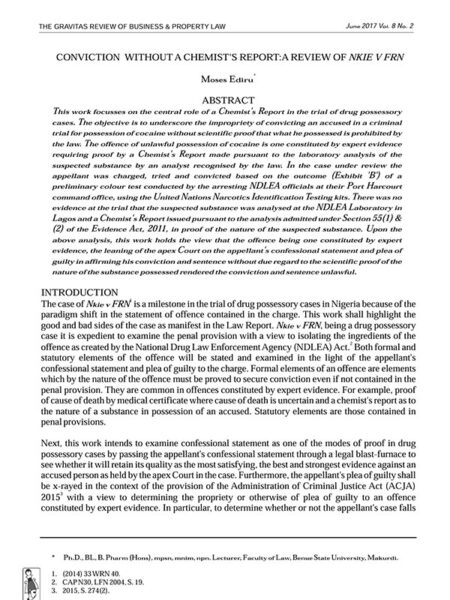
Conviction without a Chemist’s Report: A Review of Nkie v FRN
0₦2,500.00Dr Moses Ediru, of the Faculty of Law, Benue State University in his article “Conviction Without a Chemist’s Report: A Review of Nkie v FRN“, argues that in the trial of drug possessory cases, where the offence is one constituted by expert evidence, presentation of a Chemist’s Report is imperative. In the case under review, the appellant was charged, tried and convicted based on the outcome of a preliminary colour test conducted by the arresting NDLEA officials using the United Nations Narcotics Identification Testing kits. The suspected substance was not analysed at the NDLEA Laboratory and a Chemist’s Report issued pursuant to the analysis, in proof of the nature of the suspected substance. The article argues that the offence being one constituted by expert evidence according to the National Drug Law Enforcement Agency Act, the leaning of the Supreme Court on the appellant’s confessional statement and plea of guilty in affirming his conviction and sentence without due regard to the scientific proof of the nature of the substance possessed rendered the conviction and sentence unlawful.
-
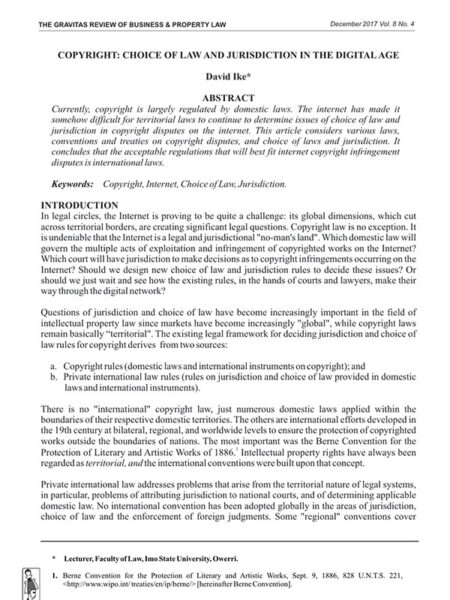
Copyright Choice of Law and Jurisdiction in the Digital Age
0₦2,500.00David Ike of the Imo State University in his article, “Copyright: Choice of Law and Jurisdiction in The Digital Age”, argues that the internet is a legal and jurisdictional “no-man’s land”. He reviews international conventions and treaties on copyright disputes, and concludes that the existing legal framework for deciding jurisdiction and choice of law rules (domestic laws and international instruments on copyright, and private international law rules), are ill-fitted to respond to the needs of copyright infringement on the internet.
-
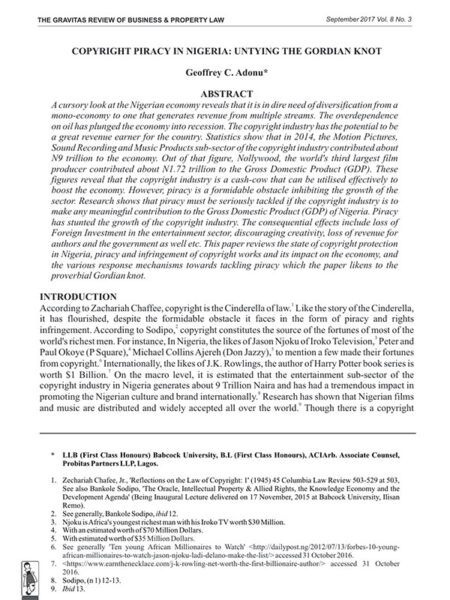
Copyright Piracy in Nigeria: Untying the Gordian Knot
0₦2,500.00Geoffrey Adonu, Counsel, Probitas Partners LLP in his article, “Copyright Piracy in Nigeria: Untying the Gordian Knot”, notes that piracy is a monstrous impediment that has stunted the growth of the copyright industry. The consequential effects include loss of investment in the entertainment sector, loss of revenue for authors and the government, and discouragement of creativity. Adonu reviews the state of copyright protection in Nigeria, piracy and infringement of copyright works, and, borrowing from international best practices, the response mechanisms that can be employed in tackling piracy which he likens to the proverbial Gordian knot.
-
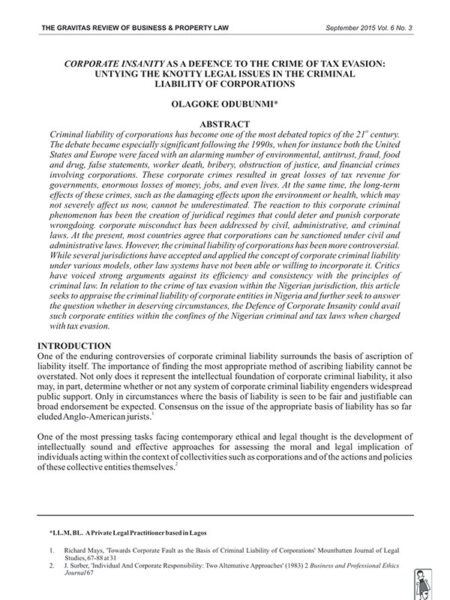
Corporate Insanity as a Defence to the Crime of Tax Evasion: Untying the Knotty Legal Issues in the Criminal Liability of Corporations
0₦2,500.00Odubunmi Olagoke in his article “Corporate Insanity as a Defence to the Crime of Tax Evasion: Untying the Knotty Legal Issues in the Criminal Liability of Corporations” explores the various theories of criminal liability and consider, from a distillation of the principles, the defence of Corporate Insanity to a crime of tax evasion.
-
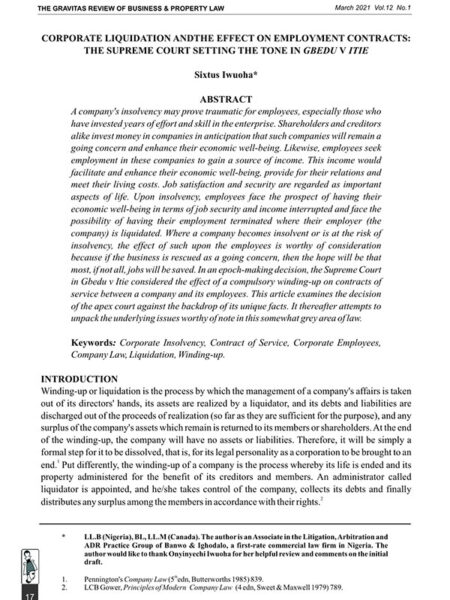
Corporate Liquidation and the Effect on Employment Contracts: The Supreme Court Setting the Tone in Gbedu v Itie
0₦2,500.00Sixtus Iwuoha, Associate at Banwo & Ighodalo in his article, Corporate Liquidation and the Effect on Employment Contracts: The Supreme Court Setting the Tone in Gbedu v Itie discusses the effect of a compulsory and voluntary winding-up of a company on employment contracts of workers in his review of the epoch-making decision of the Supreme Court in the case of Gbedu v Itie.
-
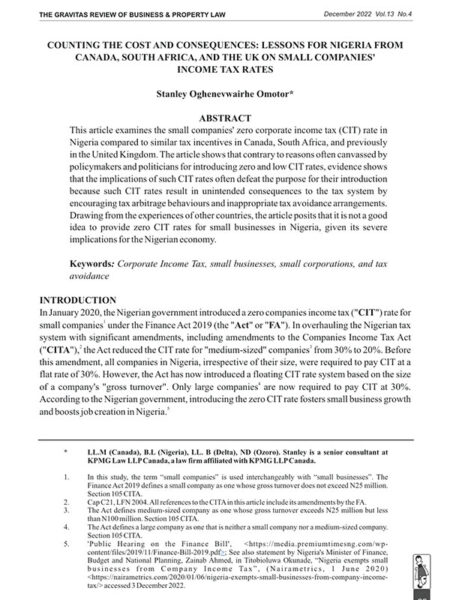
Counting the Cost and Consequences: Lessons for Nigeria from Canada, South Africa, and the UK, on Small Companies’ Income Tax Rates
0₦2,500.00Stanley Omotor, senior consultant at KPMG Law LLP Canada, a law firm affiliated with KPMG LLP Canada, in his article, Counting the Cost and Consequences: Lessons for Nigeria from Canada, South Africa, and the UK, on Small Companies’ Income Tax Rates, examines the small companies zero corporate income tax (CIT) rate in Nigeria, in comparison with similar tax incentives existing in Canada, South Africa, and previously in the United Kingdom. Omotor shows that contrary to reasons often canvassed by policymakers for introducing zero and low CIT rates, evidence shows that the implications of such CIT rates often defeat the purpose for their introduction because such CIT rates result in unintended consequences to the tax system by encouraging tax arbitrage behaviours and inappropriate tax avoidance arrangements. Drawing from the experiences of other countries, Omotor posits that it is not a good idea to provide zero CIT rates for small businesses in Nigeria, given its severe implications for the Nigerian economy.
-
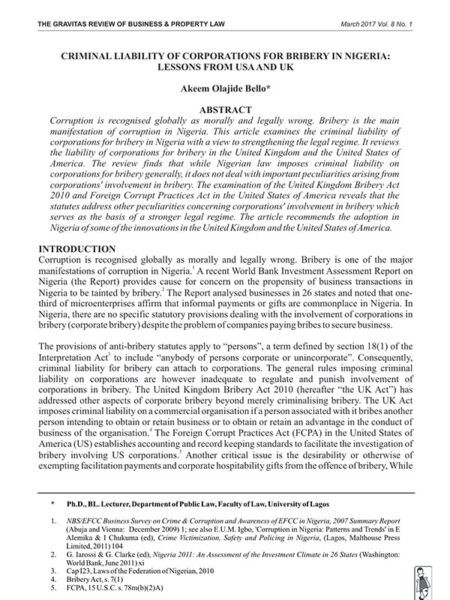
Criminal Liability of Corporations for Bribery in Nigeria: Lessons from USA and UK
0₦2,500.00Dr Akeem Bello of the Department of Public Law, University of Lagos in his article “Criminal Liability of Corporations for Bribery in Nigeria: Lessons from USA and UK” examines Nigerian law on bribery and posits that there is no specific legislation designed to criminalise corporate bribery. He examines the criminality of ‘Facilitation Payment’ and ‘Corporate Hospitality’ and recommends that expanding the scope of bribery offences to cover all “persons”irrespective of whether they are public, private sector officials or corporate entities will strengthen the law on bribery in Nigeria.
-
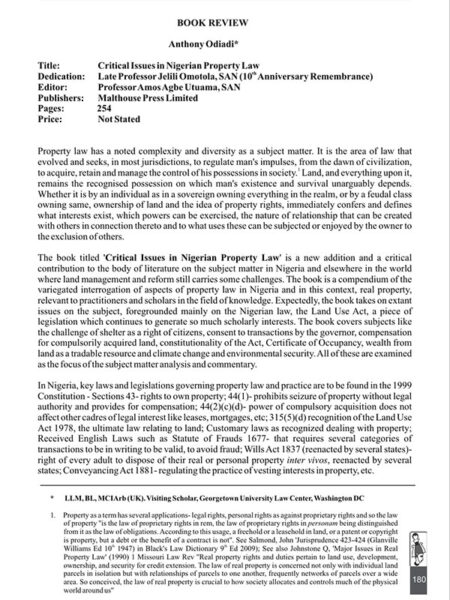
Critical Issues in Nigerian Property Law
0₦2,500.00Tony Odiadi, Visiting Scholar, Georgetown University Law Center, Washington DC, reviews the book, “Critical Issues in Nigerian Property Law” edited by Professor Amos Utuama, SAN. He gives an expansive commentary on the various topics treated by eminent authors and concludes that the book is a fitting and significant dedication to the memory of Professor Jelili Omotola, SAN in whose honour the book was put together.
-
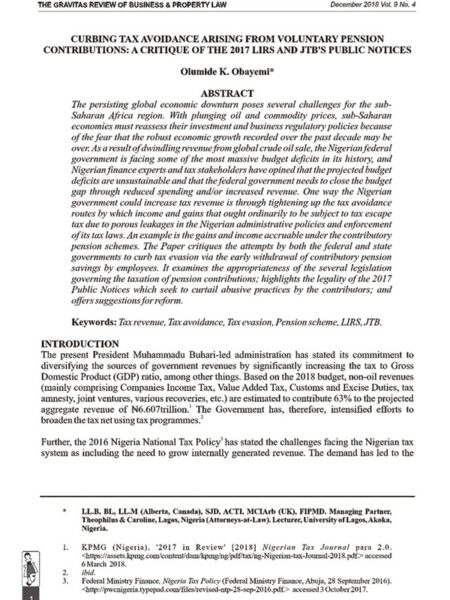
Curbing Tax Avoidance Arising from Voluntary Pension Contributions: A Critique of the 2017 LIRS and JTB’S Public Notices
0₦2,500.00Dr Olumide Obayemi of the University of Lagos in his article, Curbing Tax Avoidance Arising from Voluntary Pension Contributions: A Critique of the 2017 LIRS and JTB’S Public Notices, observes that in order to increase its revenue to fund massive budget deficits, the Nigerian governments have introduced measures to curb tax avoidance mechanisms. One of such measures by the Lagos Internal Revenue Service and the Joint Tax Board is the capping of voluntary pension contributions at 1/3 of employee’s salary and limiting withdrawals from the Retirement Savings Account. Obayemi comprehensively reviews the legality of the measure within the gamut of laws regulating pension of employees in Nigeria and advocates reforms that will enhance clarity over chaos.
-
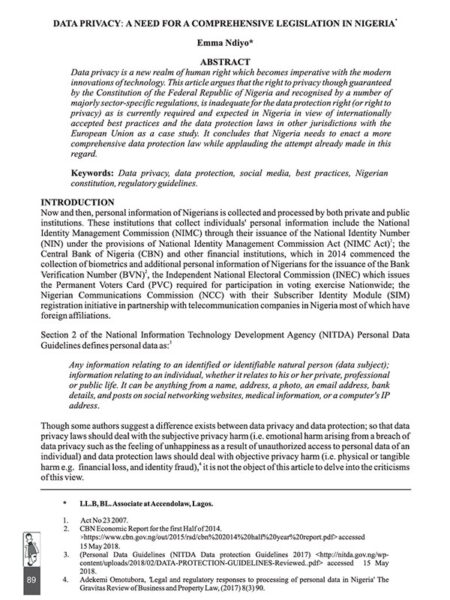
Data Privacy: A Need for a Comprehensive Legislation in Nigeria
0₦2,500.00Emma Ndiyo, Associate, Accendolaw in her article, Data Privacy: A Need for a Comprehensive Legislation in Nigeria notes that ‘Data is the new Oil’ and Data Privacy is a new realm of human right which becomes imperative with the unprecedented innovations in technology and the threats of fraud, phishing scams, and identity theft. She argues that the right to privacy though guaranteed under the Constitution and recognised by some sector-specific regulations, is inadequate given internationally accepted best practices. She examines the EU’s General Data Protection Regulation (GDPR) adopted in May 2018 which compelled big data entities such as Facebook, Google and Twitter to adjust their Terms of Use and Privacy Policy, and concludes that there is the need for an overarching data protection law which would not only enhance data privacy but regulate the collection and processing of personal data.
-
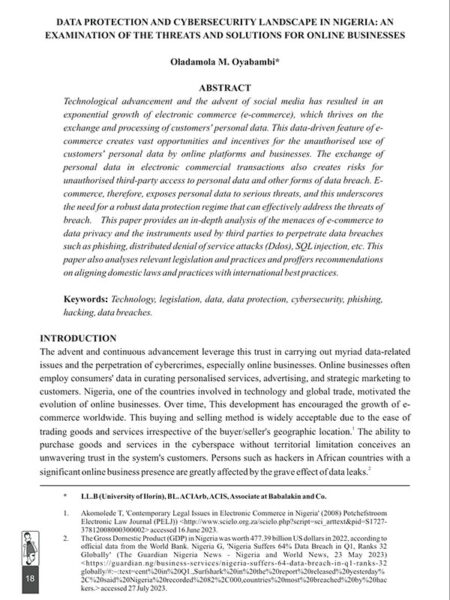
Data Protection and Cybersecurity Landscape in Nigeria: An Examination of the Threats and Solutions for Online Businesses
0₦2,500.00Oladamola M. Oyabambi, in his article, Data Protection and Cybersecurity Landscape in Nigeria: An Examination of the Threats and Solutions for Online Businesses, dwells on technological advancement and the advent of social media on the growth of electronic commerce (e-commerce), which thrives on the exchange and processing of personal data of customers. This data-driven feature of e-commerce creates vast opportunities and incentives for unauthorised use of personal data of customers by online platforms and businesses. The exchange of personal data in electronic commercial transactions also creates risks for unauthorised third-party access to personal data and other forms of data breach. E-commerce therefore exposes personal data to serious threats, and this underscores the need for a strong data protection regime that can effectively address the threats of breach. Oyabambi provides an in-depth analysis of the menaces of e-commerce to data privacy, the instruments used by third parties to perpetrate data breaches such as: phishing, distributed denial of service attacks (Ddos), SQL injection etc. He analyzes relevant legislation and practices, and proffers recommendations on how best to align domestic laws and practices with international best practice.
-
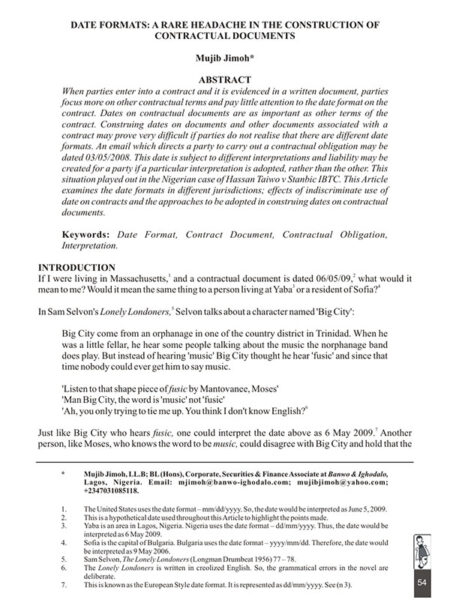
Date Format: A Rare Headache in the Construction of Contractual Documents
0₦2,500.00Mujib Jimoh, Associate at Banwo & Ighodalo Lagos Nigeria, in his article, Date Format: A Rare Headache in the Construction of Contractual Documents, observes that when parties enter into a contract, and it is evidenced in a written document, they usually focus more on other contractual terms and pay little attention to the date format on the contract. Construing dates on documents may prove very difficult if parties do not realise that there are different date formats. An email which directs a party to carry out a contractual obligation may be dated 03/05/2008. This date is subject to different interpretations and liability may be created for a party if a particular interpretation is adopted, rather than the other. This situation played out in the Nigerian case of Hassan Taiwo V. Stanbic IBTC. Mujib examines the date formats in different jurisdictions, the effects of indiscriminate use of date on contracts, and the approaches to be adopted in construing dates on contractual documents.
The Gravitas Review of Business & Property Law



